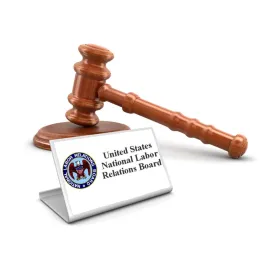The National Labor Relations Board (NLRB) last week announced its rulemaking priorities for the coming year in its Spring 2019 regulatory agenda. The proposed rules, announced May 22, foreshadow the Trump Board's continuing shift to create employer-friendly standards. Any proposed rule will need to obtain a majority vote of the current 3-1 Republican Board to be finalized.
The proposed rules are designated as short- and long-term action items. Regardless, they could take a year or more to be promulgated. The short-term action items include:
-
Current standards for the "blocking charge" rule, which calls for elections to be paused if workers or unions file unfair labor practice charges alleging employer misconduct
-
The "voluntary recognition bar," a policy that workers must wait at least six months before they can seek to oust a union that had been voluntarily recognized as their bargaining representative
-
The formation of Section 9(a) bargaining relationships in the construction industry
-
Standards for determining whether private college or university graduate student assistants or teaching assistants—students who perform services in connection with their studies—are "employees" under the National Labor Relations Act (NLRA)
-
Standards for access to an employer's private property for worker organizing and other collective actions
In addition to proceeding with rulemaking on the joint-employer standard, another long-term action item involves reevaluating existing representation-case procedures, the Obama NLRB's so-called "ambush election" rules.
The U.S. Department of Labor also has indicated that a few new issues are on its radar. It plans to update rules governing the Family and Medical Leave Act by 2020. It also plans to issue a proposed rule about the fluctuating workweek standard for overtime pay.
On the other hand, the Equal Employment Opportunity Commission has pushed back its timeline to December for releasing a new rule on workplace wellness programs, after it was required to rethink incentives that encourage employees to join the plans, but also disclose health information.
Employers should stay tuned, since these regulatory goals will change the playing field for all employers.




 />i
/>i
